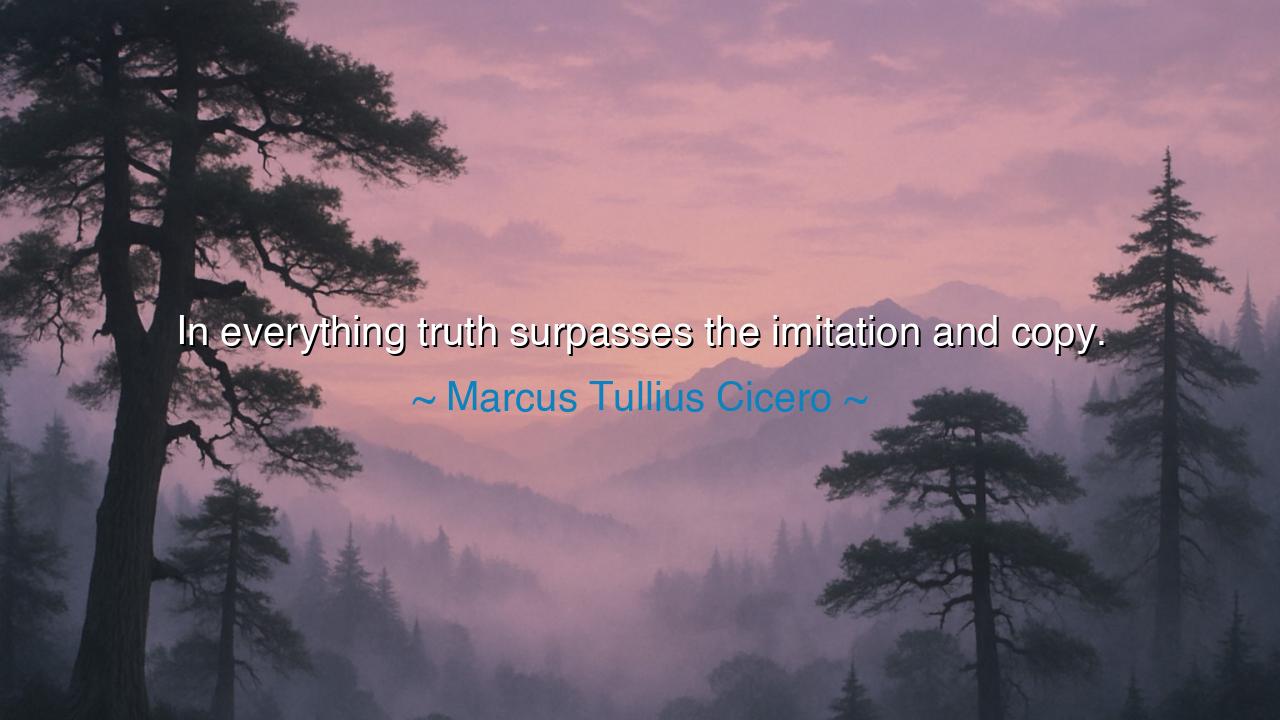
In everything truth surpasses the imitation and copy.






Marcus Tullius Cicero, the great Roman orator and philosopher, once declared with the weight of eternal wisdom: “In everything truth surpasses the imitation and copy.” In this saying, he draws a clear line between the living fire of truth and the pale shadows of imitation. Cicero, who devoted his life to the defense of justice and the pursuit of knowledge, understood that copies may amuse, illusions may dazzle, but they can never equal the strength and purity of truth itself. Truth, like the sun, shines with its own light, while imitations, like the moon, only borrow their glow.
The origin of these words lies in Cicero’s lifelong battle against corruption, deceit, and false rhetoric in the Roman Republic. He watched as men twisted the art of speech into weapons of manipulation, using imitation of virtue rather than the substance of it. He saw false leaders rise to power by copying the appearance of justice while discarding its essence. Thus he reminded his listeners that in the end, truth always surpasses the counterfeit, for truth carries within it the power of permanence, while falsehood collapses under its own weight.
History itself bears testimony. Consider the story of Abraham Lincoln, whose speeches and leadership during America’s Civil War were rooted not in imitation of lofty ideals, but in the living conviction of truth—that freedom belongs to all men. His words at Gettysburg were plain and simple, not adorned with empty flourishes. Yet they endure because they were grounded in truth. Meanwhile, countless imitators of eloquence in his own day are forgotten, their voices fading like echoes of shadows. Here we see Cicero’s wisdom alive: imitation may charm for a moment, but truth endures for ages.
The arts, too, reveal this principle. An artist who paints by copying another may capture form, but not spirit. Yet one who paints from the depth of truth—truth of emotion, of experience, of vision—creates work that stirs the soul. When Vincent van Gogh painted his wheat fields, he was not imitating nature’s shapes but revealing its truth as he saw it. And though rejected in life, his canvases today burn with a light that no copy can surpass. The truth of his vision overcame the shadows of imitation.
Cicero’s statement also calls us to reflect on our own lives. How often do men and women live as copies of others, imitating what is fashionable, acceptable, or convenient, rather than living from the ground of their own truth? Such lives may win applause for a season, but they lack the power of authenticity. To live truthfully is harder, for it requires courage. But it is only in truth that the soul finds greatness, and only in authenticity that life attains beauty.
The lesson, then, is clear: reject the temptation to live in imitation. Strive instead for the substance of truth. In speech, let honesty outweigh flattery. In art, let authenticity surpass mimicry. In life, let your actions flow from your deepest convictions, not from the borrowed garments of another’s will. For truth may demand sacrifice, but imitation leads only to emptiness. Cicero knew this well, for he himself faced exile and death rather than surrender to falsehood.
Practically, this means cultivating self-awareness and courage. Ask yourself daily: “Am I living from truth, or am I wearing a mask?” Speak with sincerity, even when it costs you favor. Create with authenticity, even when others do not understand. Refuse to live as a shadow of another. For truth, once embraced, shines with a radiance that no copy can match.
Thus Cicero’s words echo across the centuries: truth surpasses the imitation and copy. Let us honor this wisdom, and let our lives be not pale reflections, but living flames of authenticity. For in truth alone lies greatness, endurance, and the glory that time cannot erase.






7VTrung Huy 7/1 Vu
Cicero’s quote speaks to the value of truth over imitation, but it also raises a question about how we define truth. In a world where perceptions and beliefs can differ widely, how do we know when we’ve reached the ‘truth’ or when we’re simply imitating a certain view? Is truth always absolute, or can it be shaped by context and perspective?
ADha anh dao
I agree with Cicero that truth is the most valuable thing, but I wonder how we define truth in an age where perspectives are so varied. If truth surpasses imitation, does that mean all forms of copying or following others are inferior? Or is it possible that imitation can sometimes help uncover deeper truths when applied thoughtfully or creatively?
NNgoc
This quote feels like a reminder of the importance of staying true to oneself and one’s values, especially in a society that often encourages imitation for the sake of success or acceptance. But does that mean we should reject influences or inspiration from others entirely? Can imitation sometimes lead to something greater, or does it always fall short of the truth Cicero speaks of?
THTran Thu Hien
Cicero’s belief that truth surpasses imitation or copy makes me think about the authenticity of our actions. In a world where so much is copied or mimicked, whether in art, business, or even personal behavior, can we truly value originality? Does imitation ever lead to discovering new truths, or does it merely mask them, making it harder to discern what’s real?